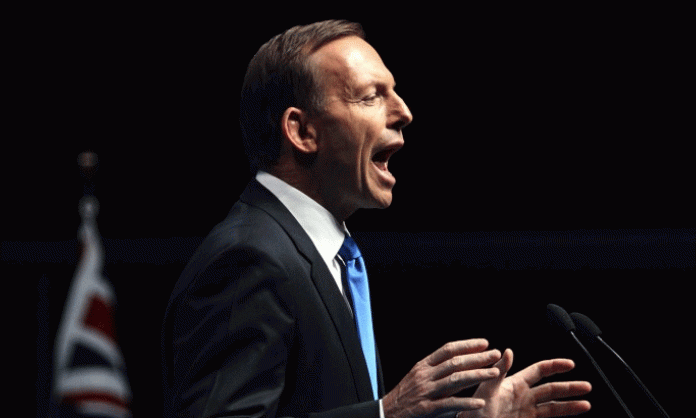In what passes for democracy in Australia, the vilest of the vile has won.
Labor lost because for six years it ruled, just like the Liberals before it, for the big end of town and did nothing to advance the interests of its working class supporters.
While hospitals, education, public transport and basic social services were underfunded, the banks and the mining companies raked in record profits, on which Labor let them pay only peanuts in tax.
The most grotesque legacy of this Labor government is that under Rudd and Gillard’s rule, Gina Rinehart became the richest woman in the world, while single parents had their pittance of a benefit slashed and the dole was held well below the poverty line.
Labor maintained the Howard government’s core policies. It refused to abolish the anti-worker WorkChoices legislation. It extended Howard’s racist Northern Territory intervention. It continued to back the brutal imperialist war in Afghanistan. It refused to legislate for same-sex marriage. It gave billions of dollars in handouts to big business.
When it came to treatment of victims of torture and persecution, Labor even topped Howard for racism and cruelty. Labor’s refugee policy was depraved.
But if workers were disillusioned with Labor, there was no groundswell of enthusiasm for the Liberals. So while Labor’s primary vote in the House of Representative fell 4 percent to 34 per cent, its lowest level in a hundred years, the Coalition’s vote rose by less than 2 percent to 45 per cent.
The two party preferred swing to the Liberals of 3.5 per cent was enough to give them a clear majority of seats, but this was no landslide. It was less than the 5 percent swing John Howard got in 1996.
Labor still gained almost 47 per cent of the two party preferred vote. And for all the pre-election talk of a Liberal surge in the working class western suburbs of Sydney, Labor held onto the great bulk of its seats there.
The Greens paid dearly for propping up the wretched ALP government. Immediately before the election, the Greens sought to distance themselves from Labor. However, their failure to provide a fighting alternative that mobilised working class resistance to Labor caused their vote to plunge from 11.8 per cent to 8.4 per cent.
The disillusionment with the major parties and the Greens was most marked in the Senate, where Labor’s vote fell 4.6 per cent, the Coalition’s 1.5 per cent and the Greens’ 4.4 per cent. The beneficiaries were a swag of crackpot or right wing minor parties, most notably mining billionaire Clive Palmer’s Palmer United Party with 5 per cent.
Another sign of the disillusionment with official politics was a further rise in the informal vote, to 5.9 per cent. In NSW, where the stench of corruption associated with Labor is most intense, the informal vote reached 7.7 per cent. On top of that, a quarter of young people newly eligible to vote did not even bother to get on the electoral roll.
So for all the talk of a crushing victory for Abbott, he has no mandate to go on a sweeping offensive against workers’ rights and conditions, no mandate for a wave of cuts.
Abbott won because Labor did not deliver for workers. He kept to his small target strategy and was very careful not to endorse publicly the wish list of anti-worker demands the Liberals’ big business backers championed.
But there is no doubt about the class interests that the Liberals represent. A clear symbol of this was mining billionaire Gina Rinehart’s guest appearance at Barnaby Joyce’s victory celebration in Tamworth. And of course Abbott was stridently backed by his friend Rupert Murdoch’s press empire.
It is only a question of how hard and how quickly they will move against us. Much will depend on what happens with the economy. If it continues to falter, then we need to prepare for an avalanche of attacks as the Liberals move to shore up the bosses’ profits.
We are going to have to fight them in the workplaces, in the streets and on the campuses. Labor is not going to save us, and neither are the Greens. The only serious reforms that parliament will deliver are those for which we build mass campaigns outside parliament.
We need to learn the lessons of last time round. The Howard government was brought down by the massive union campaign against his hated WorkChoices legislation.
That campaign involved hundreds of thousands of striking workers taking to the streets and had the potential not only to defeat WorkChoices but to begin to revive working class confidence to stand up to the whole neoliberal offensive. We had a chance to begin to turn the tide and rebuild union organisation.
The trouble was that, in preparation for the 2007 elections, the ACTU leadership wound up the industrial campaign and the mass protests against WorkChoices and converted them into a vote Labor campaign.
In exchange for a few vague promises, Labor was given a blank cheque by the union leaders. In office, facing no serious industrial pressure from the unions, Labor predictably kowtowed to the bosses and preserved the great bulk of WorkChoices.
For six years of the Labor government, the union leaders have done little more than grumble – reflected in the fact that in the last 12 months, there were only 200,000 days of strike action, compared to the millions of days on strike back in the 1970s, when we were actually winning real gains.
The union leaders’ failure to fight under Labor has delivered us into the hands of Abbott. We can’t allow this story to repeat itself. Now is not the time to “box clever”. We need to get into the ring and start delivering some punches and not allow the ALP leaders to restrain us.









